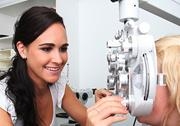The eyes have it
Jenna Owen is determined to close the gap on Indigenous health when she becomes the first Aboriginal optometrist in NSW.
Jenna Owen is determined to close the gap on Indigenous health when she becomes the first Aboriginal optometrist in NSW.

Jenna Owen is heading for a double first. The 21-year-old from Dubbo is the first in her family to attend university and when she completes her studies in 2010, she will become the first Indigenous optometrist in NSW.
Victoria is home to Australia's only other Aboriginal optometrist - in a nation where 20,000 Indigenous children have trachoma, a preventable cause of infectious blindness.
Jenna is supported by the Puggy Hunter Memorial Scholarship, which aims to redress the underrepresentation of Indigenous Australians in the health professions. She is also a beneficiary of a scholarship for Indigenous students administered by UNSW's Shalom College, Nura Gili and the Muru Marri Indigenous Health Unit.
UNSW is the only university in the state to offer training for students wanting to become optometrists.
And Jenna is already putting her studies into practice. As part of the teaching program at UNSW, optometry students in fourth and fifth years do free consultations with the public through the University's Optometry Clinic. Students also do two training sessions with practising optometrists - two weeks in the country and the other two in the city.
"Working as an optometrist in rural and regional Australia provides more challenges and opportunities compared to urban centres," she says. "There's a broader range of clinical issues to manage."
Jenna intends to use her skills among the Aboriginal community in Dubbo, because "it's important for Indigenous people to have the opportunity to consult health professionals who have an understanding of their values and culture".
The full version of this article appears in the May/June issue of Uniken, which is out now.
New scholarship
Eye care manufacturer Luxottica recently announced a $60,000 scholarship for Indigenous optometry students at UNSW.
"This new scholarship program will allow greater access and more opportunities to promote eye health to Indigenous communities," says the company's chief executive, Chris Beer.
"This is vital given that Australian Aborigines and Torres Strait Islanders suffer one of the highest rates of diabetes of any population group in the world - a condition that can pose many serious eye health risks, including blindness."
Media Contact: Dan Gaffney | 0411 156 015 | d.gaffney@unsw.edu.au